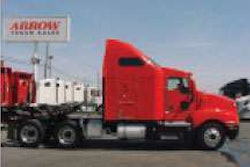If it’s broke, you may have to eat it
‘Better safe than sorry’ a headache for foodstuff haulers
By Henry Seaton
Q We are a broker of perishable commodities. We hired a carrier that transloaded a load of cheese at its refrigerated warehouse, breaking the first seal and reapplying a second seal. The consignee rejected the load, and the cheese manufacturer fed the entire load to hogs without a Food and Drug Administration inspection, claiming first that “the government made them do it” because the original seal was not intact, and secondly that it was permitted to do so under the contract we signed. The carrier refuses the claim. What should we do?
 HENRY SEATON -- [email protected]
HENRY SEATON -- [email protected]A About four years ago I addressed the broken seal problem and the shipper’s duty to mitigate damages, pointing out that shippers are hard-pressed to prove contamination due to a broken seal when the product otherwise is packaged in containers, boxes or shrinkwrap. (See “Sour pickles not spoiled,” CCJ July 2006.) Since that time, the destruction of perfectly good product due to broken seals has continued unabated. But no one has produced for me any security regulation trumping the shipper’s duty to inspect the product and exercise reasonable mitigation.
This “better safe than sorry” attitude by shippers is becoming a major problem for the foodstuff industry. FDA on April 30 published a Notice of Proposed Rulemaking concerning “Implementation of the Sanitary Food Transportation Act of 2005.” Included in the Federal Register notice was a compendium of existing FDA regulations, none of which lend any support to the cheese manufacturer’s position in your case.
In the absence of evidence of contamination, a broken seal does not require a shipper to deem the product unfit for human consumption subject to the Sanitary Food Transportation Act of 2005. FDA notes with approval a Michigan Department of Agriculture study that found a lack of adequate securement or lock created food transportation problems on smaller box trucks and for transporters of ethnic foods, as well as “little or no areas of concern” identified with larger (semi-tractor trailer) trucks inspected during the survey. (See Federal Register, Vol. 75, No. 83, p. 22713.)
My review of the FDA regulation revealed one important caveat, though. FDA requires foodstuff shippers, receivers and transporters to establish and maintain chain of custody records for shipments, including the shipment particulars and the name and address of every carrier in possession and control of the product during transit. (See 21 C.F.R. 1.352.) These regulatory requirements suggest that if the shipping community is serious about compliance, it needs to ensure shipments are not “double brokered” and that each bill of lading correctly identifies the name of the carrier to whom the product is tendered, not the broker.
In your case, I strongly disagree with any shipper’s contention that the government requires destruction of foodstuff because of the broken seal, regardless of the cause and without any physical inspection or duty to mitigate. Unfortunately, this advice does not save you, because you contractually agreed to indemnify the shipper from loss. You waived the Carmack Amendment and the shipper’s duty to mitigate, and you allowed the shipper “sole discretion, not subject to a reasonableness standard” to do whatever it wished with the product and send you the bill.
You should have watched what you were signing. You certainly cannot expect that any knowledgeable motor carrier you hire will waive the shipper’s duty to mitigate damages unless a shipment is practically worthless. You certainly cannot expect cargo insurers to pay a claim under these circumstances.
— Henry Seaton is a transportation lawyer who represents carriers.
In Brief
* Harold G. Stewart was sentenced June 17 in U.S. District Court and ordered to pay $7,316 in restitution for expenses the State of Louisiana incurred to recall and retest drivers who obtained commercial driver’s licenses through Stewart. Stewart pled guilty for his role in falsifying 250 out of 320 CDL skills tests he conducted.
* Massachusetts, Louisiana and Delaware enacted primary laws that ban texting while driving. The Massachusetts law fines adults $100 for a first offense, $250 for a second offense and $500 for a third. Louisiana’s law fines drivers $175 for a first offense and up to $500 for any that follow. Delaware’s law, which also bans handheld cell phone use, fines drivers $50 for a first offense and $100 to $200 for a second offense.
* FreightWatch International, a global logistics security solutions provider, announced its expansion into Canada, providing clients a complete end-to-end cross-border solution for monitoring their supply chains.
* The California Air Resources Board settled with three companies for more than $43,000 total for various clean air law violations. Paragon Industries of Fresno was fined $22,125, Superior Grocers of Santa Fe Springs was fined $15,300, and HFS North America of Bloomingdale was fined $6,000.
* J.J. Keller & Associates’ CSA 2010 Professional Advisory & Support Service – CSA 2010 PASS – puts one of the company’s regulatory and safety consultants in contact with fleet managers and executives to provide a tailored assessment of the fleet’s exposure to DOT interventions and fines. Go to www.jjkellerservices.com/consulting/csapass.html.
Court confirms $10,000 limit on surety claims
An insurance company’s liability under a $10,000 surety bond provided to a freight broker is capped at a total of $10,000 – not at $10,000 per claim – in the absence of a provision to the contrary, a federal appeals court ruled. The decision, issued June 22 by the U.S. Court of Appeals for the District of Columbia Circuit, involves a surety bond covering Sam’s Transportation Service, which had become insolvent.
“The standardized federal form that governs these surety bonds removes any lingering doubt on the disputed issue in this case,” the court said. Form BMC 84 provides a set of standard terms and conditions, “saying quite plainly that the face value of the bond is ‘the sum of $10,000’ ” and that the liability is discharged when payments under the bond amount in the aggregate to that value.
Several groups in the trucking industry are pushing for a higher surety bond requirement to address the very issue raised by Sam’s bankruptcy. Earlier in June, Sens. Olympia Snowe (R-Maine) and Amy Klobuchar (D-Minn.) introduced S. 3483, legislation to protect motor carriers in their dealings with freight brokers; among the provisions of that legislation is an increase in the minimum surety bond to $100,000. The bill also includes some protections for brokers in their dealings with surety companies. n










